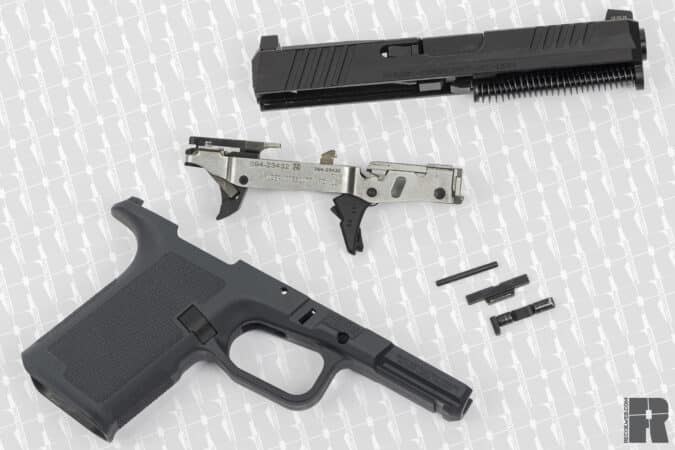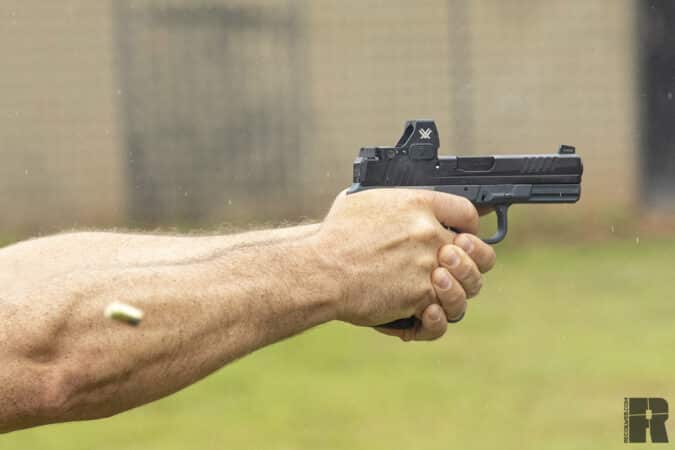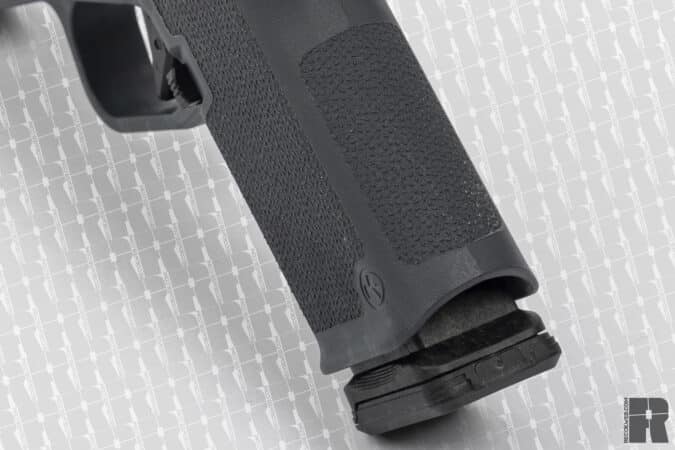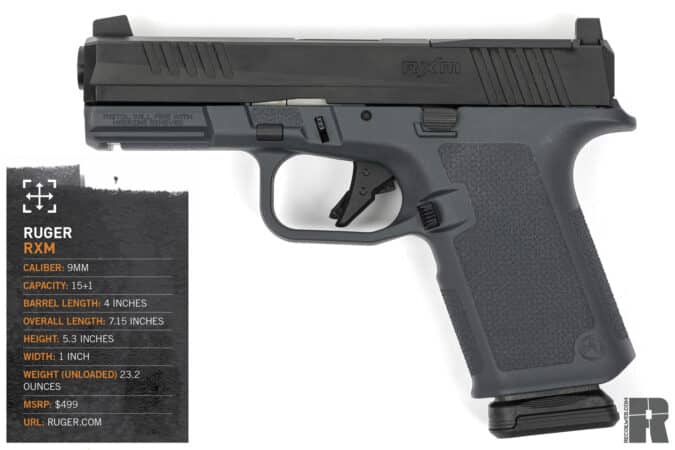With a Modular Fire Control Insert and Glock-Compatible Internals, the RXM Is Not Just Another G19 Clone
Glock versus SIG — it’s a rivalry that leads to never-ending debates between the most obsessive (and obnoxious) fans of each brand. Watching from the sidelines, it’s easy to see that both platforms have their advantages.
Glock offers time-tested reliability and outstanding aftermarket parts selection, while SIG has the modularity of the P320’s Fire Control Unit, which allows the serialized portion of the pistol to be swapped into a wide variety of grip and chassis configurations.
Have you ever found yourself wondering what would happen if the best parts of both these designs were mashed together? We certainly have.
And by the looks of it, so did the engineers at Ruger and Magpul. These two companies have joined forces to develop a new pistol called the RXM, which features a removable stainless steel Fire Control Insert (FCI), interchangeable Magpul grip modules, and compatibility with Glock Gen 3 parts, magazines, and holsters.
While remaining functionally (and legally) distinct from its striker-fired competitors, the RXM integrates some of my favorite aspects of each pistol ecosystem.
In June 2024, Ruger invited a handful of folks out to Gun Talk Media’s facility in Louisiana to spend three days testing pre-production samples of the RXM. Chris Cerino, a retired law enforcement officer with 30 years of experience, served as our instructor and helped us put the new pistol through its paces.
SPECS
- Caliber: 9mm
- Capacity: 15+1
- Barrel Length: 4″
- Overall Length: 7.15″
- Height: 5.3″
- Width: 1″
- Weight (Unloaded): 23.2 Ounces
- MSRP: $499
PROS:
- Modular FCI makes grip mods and capacity changes easy (and reversible)
- Compatible with Glock mags and aftermarket parts
- Surprisingly good factory trigger
- Fits a variety of red dot sights, no adapter plate required
CONS:
- High-profile slide stop may be inadvertently activated, especially by shooters with large hands
- Only available with gray grip at launch (other colors coming soon)
FEATURES & DETAILS
The RXM, which stands for Ruger x Magpul, is a compact 9mm pistol comparable in size to a Glock 19. It features a 4-inch button-rifled barrel and is set up for 15+1 capacity with two included Magpul PMAG GL9 magazines. The slide features a black nitride finish, prominent front and rear serrations, and cowitness-height iron sights with a tritium front. Glock-compatible aftermarket sights can be used if, like me, you prefer to pair your red dot sight with plain black backup irons.
Speaking of which, it’s also directly compatible with many common red dot footprints — including RMR, Delta Point Pro, and RMSc — via installation of either two or four tiny removable pins, rather than footprint-specific adapter plates. Some enclosed emitter optics such as the ACRO will need an additional adapter plate, but that’s to be expected.
Magpul’s role in this collab is an RXM-specific series of EHG (Enhanced Handgun) polymer grips designed to accommodate Ruger’s serialized Fire Control Insert. At launch, the RXM will be available with a Stealth Gray grip designed for 15-round mags — we’re told the color was intended to stand out on shelves full of black and earth-toned pistols.
Magpul will eventually offer EHGs in other colors including black, flat dark earth, and olive drab, as well as 12-round subcompact and 17-round full-size grips for the RXM. According to a Magpul rep, MSRP for each grip module will be around the $40 mark.
Of course, this modular FCI — not to be confused with SIG’s FCU or the Springfield Echelon’s Central Operating Group (COG) — opens the door to a “roll your own” approach to building your ideal pistol. Thinking about stippling the grip? Give it a try, and if you screw it up, you’re only out 40 bucks.
Alternatively, you can buy an extra EHG module and send it to a stippler for custom work without having to ship the whole firearm. Want a grip with a larger flared magwell and aggressive texture for competition use? Magpul says that may be a possibility in the future. And as long as you have the appropriate magazines, you can convert your 15-round gun into a 12- or 17-rounder in minutes.

As for the mechanical compatibility, a Ruger representative said the RXM will accept approximately 90 percent of parts designed for “Gen 3 type pistols,” though he was careful not to mention the big G company by name. From a cursory examination, this appears to include the trigger, striker, firing pin, extractor, various springs, back plate, slide stop, barrel, and (as previously mentioned) iron sights and magazines. Notably, the locking block and trigger housing are different.
Depending on tolerances, some aftermarket triggers will work within the FCI module, while some may not. Ruger said the Timney Alpha drop-in Glock trigger didn’t work, but most trigger upgrade kits which maintain the factory trigger housing can be installed. A majority of existing Glock-19-compatible holsters, including light-bearing variants, will also fit the RXM.
The last critical question is “what does it cost?” MSRP is $499. Given the fact that retail prices are typically quite a bit below MSRP, the RXM should be able to compete directly with most of the affordable, optics-ready G19 clones currently on the market.
Ruger acknowledges that it’s “entering a competitive market” but is confident that this pistol’s features will set it apart. For those of you in restrictive states, a 10-round variant is available at the same price point, although the spec sheet mentions it will not be available in California or Massachusetts.
ON THE RANGE
After discussing the pistol’s specs with Ruger and Magpul representatives, we headed out to the range with instructor Chris Cerino. Cerino has been active in the industry for decades, is a very skilled shooter, and has previously written for Recoil, so we were glad to train with him again.

Drills began with slow and precise fire, allowing each shooter to get a feel for the RXM. As someone who carries a Glock 19 frequently, I immediately felt right at home with this pistol. The grip has a mild undercut, no finger grooves, and a magwell that’s flared just enough to keep the pinky finger seated.
Its texture should be familiar to anyone who’s used Magpul products — it’s the same TSP pattern you’ll find on an MOE rifle grip, just scaled down by 25 percent. Similarly textured ledges are present above the trigger guard, offering a tactile index point for the shooter’s thumb or forefinger. There’s also a small beavertail and scalloped cut around the mag release button.

The trigger has a smooth, nearly flat face and breaks cleanly with none of the mushiness or grittiness I’ve learned to expect in other striker-fired guns at this price point. The pull weight feels like a stock Gen 3, but everything else is noticeably improved. Its reset is relatively short and offers a clearly defined “click.”
As we moved from slow fire to multi-shot cadences, I began to experience premature slide-lock after a few rounds of rapid fire. This was a result of my large hands and high grip coming into contact with the slide stop lever, which has a raised, pyramid-shaped profile. It’s an issue I’ve occasionally experienced with stock Gen 3 guns, albeit much more infrequently.
After two days of shooting the RXM, the slide stop contact was continuous enough that I developed a painful blister on my support hand. Shooters with small hands may find this slide stop design advantageous, but if you’ve got giant mitts like mine, you may want to swap it out for a lower-profile Gen 3 part or even a Kagwerks cantilevered stop.

Aside from that shooter-specific issue, my loaner RXM performed well through three days and roughly 500 rounds without cleaning or additional lubrication. Cerino gave us drills with challenging par times, pushing us to run the guns hard but also remain accountable for every one of our misses on paper.
In order to pressure-test the RXM even more, Ruger set up a secondary shooting bay where event attendees were encouraged to repeatedly dump mags through one of the guns as fast as possible. By the time I took a turn with it, the slide and barrel were too hot to touch, prompting staff to douse it in bottled water. Despite this treatment, it kept running without a hiccup.
LOOSE ROUNDS
Five months after the event in Louisiana, Ruger sent me a loaner sample of the production-ready RXM. While this offered enough time to snap some detailed photos, I didn’t have time before the publication of this article to do more extensive live-fire testing of the production version of the gun.
That said, it looks and feels identical to the pre-production RXM I shot in June. Aside from the slide stop, which I still dislike, I’d say that’s good news. I plan to run a variety of ammo through the gun and experiment with more aftermarket parts in the near future.

In a sub-$500 segment that’s inundated with options — especially a mountain of mechanically indistinguishable Glock 19 clones — I suspect that many buyers will take one glance at the RXM and assume it’s more of the same. But after examining the features, taking it apart, and shooting it, I’d argue that this pistol deserves a closer look.
And given Magpul’s direct involvement, I’m especially excited to see the development of more grip and chassis options to house this Fire Control Insert. Third party manufacturers are sure to join the fray as well (FLUX Defense, I hope you’re watching). There’s a new modular handgun on the market, and most of us already have a pile of mags and spare parts for it.
Read the full article here

![Ruger & Magpul RxM: The Final Glock Killer? [Hands-on Review]](https://gunreviewtactical.com/wp-content/uploads/2024/12/Ruger_Magpul_RXM_06-1200x675.jpg)
